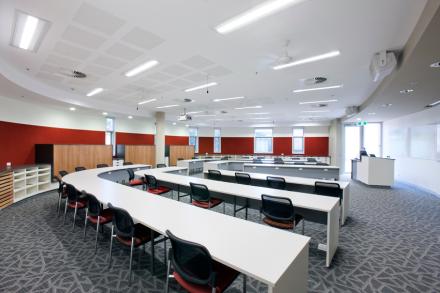
|
|
Director's Message
Dear Colleagues,
The School’s Student Seminar and School Seminar programs have attracted much discussion over past weeks. In considering possible solutions it is important to consider the purposes of these seminars, in particular:
1) to bring in emerging and leading researchers to RSES from around the country, be exposed to their research, and create opportunities for interaction and collaboration with RSES staff and student;
2) to provide platforms for RSES academics and students to present their research; and
3) to provide end of Phd seminar and other presentation opportunities for our HDR students.
I expect all academic staff to attend Student seminars whenever possible. It is part of our collective responsibility to provide a supportive environment in which our students can develop critical skills for career success. It also demonstrates respect for the important research and other contributions our students make to the School. I hope to see more staff and students attending seminars
Steve Eggins |
|
|
Student Research Adventures:
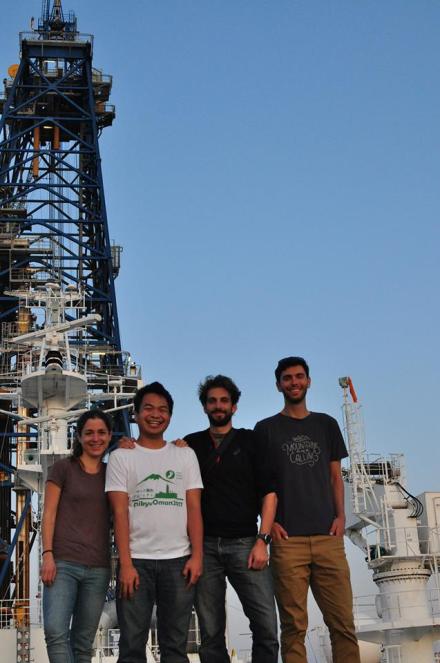
|
|
Joëlle Ducommun recenty had the pleasure of joining a science party consisting of 67 scientists, including a few Omani trainees, to characterize more than 1500m of core drilled along the Oman ophiolite. The section of ancient seafloor, from upper crustal levels to the shallow mantle, provides an invaluable archive of the processes that create and modify oceanic crust from a spreading ridge environment to its exposure along the Oman Mountains. The core description took place on board the Japanese research vessel Chikyu and as my first experience, not only on a ship but also in the land of the rising sun, I could not have expected more. I can testify that I do not get seasick (at least as long as I am not looking at cores with a hand lens for too long), but more importantly I am thankful to have been part of a collective effort that will greatly advance our understanding of the oceanic crust. The quantity and quality of data collected along the four drill holes was unprecedented, exemplifying what can be achieved when students and scientists from different cultural and disciplinary backgrounds work together for a common goal. I am grateful to have been part of the team responsible for describing the metamorphic alteration of the cores and my participation in the project will remain not only an important scientific milestone during my PhD, but also a great human and cultural experience. |
|
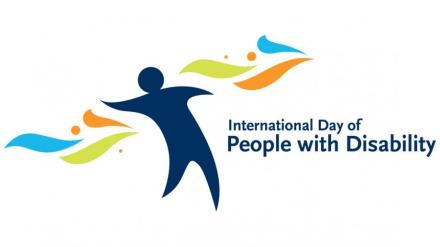
|
|
ANU Disability & Carers’ Market Day Expo – 18 October 2017
ANU is committed to equity and diversity as fundamental values for our community, by providing opportunities for an inclusive and welcoming environment. Education and collaboration within our community, in the area of disability, is an important first step in improving understanding.
In recognition of International Day of People with a Disability and National Carers’ Week, I am pleased to share that the ANU is hosting a Disability & Carers’ Market Day Expo on Wednesday 18 October 2017.
This event will promote a number of local organisations offering services and support for people with a disability and their carers.
Even if you are not a carer or a person with a disability, you are encouraged to attend to improve your disability confidence and learn about the types of support available in our community. Organisations confirmed thus far include:
Event details for the ANU Disability & Carers’ Market Day Expo are as follows:
Date: Wednesday 18 October 2017
Time: 9:00am – 12:00noon
Location: ANU Pop-Up Village Club
Audience: ANU staff and students welcome
|
|
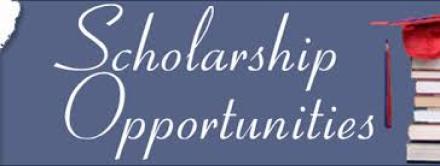
|
|
Scholarships:
3 -CSIRO Postgraduate Scholarships in Deep Earth Imaging at the Australian National University
Develop innovative concepts and tools for imaging Earth structure and its resources
• Pursue postgraduate research in a collaborative, multidisciplinary science environment
• Work together with Australia's leading science and technology organisation
Deep Earth Imaging, a CSIRO Future Science Platform, is an outstanding opportunity for postgraduate students to pursue collaborative research as part of a multidisciplinary, international geoscience research team. Launch your research career, extend your professional network and enhance your future in science and technology while helping to solve some of the world’s and Australia’s most important strategic resource issues.
We seek self-motivated and well prepared postgraduate student candidates interested in a range of geoscience-related fields, including but not limited to seismology and mathematical geophysics, data analytics, visualisation, machine learning, applied mathematics and applied physics. You will work together with the Australian National University and CSIRO scientists to develop new Earth imaging methods with a specific emphasis on subsurface imaging, natural resource prediction and targeting, and uncertainty quantification. Together, we want to build the next generation of earth imaging tools using high-performance computing infrastructure and cloud technologies to guide our understanding of Earth’s composition and dynamics, future exploration, discovery and management of Australia’s mineral, energy and water resources.
Deep Earth Imaging Postgraduate Scholarships provide select Australian National University students with access to world-class facilities and a unique opportunity to work alongside Australia’s leading research scientists. Scholarships are available to full-time postgraduate students undertaking resources-related research that leads to a Doctor of Philosophy degree.
Successful candidates will be mentored by ANU and CSIRO supervisors, allowing them to maintain and develop their university connections while being exposed to research in a working environment and pursuing a higher degree.
The Australian National University – CSIRO Deep Earth Imaging Postgraduate Scholarships comprise a stipend and funds for project-related expenses for up to three years. The program is open to Australian and international candidates (provided they meet Department of Immigration
and Citizenship policy guidelines).
We encourage interested students to send an enquiry to Hrvoje Tkalčić or Malcolm Sambridge to
discuss potential research topics. |
|
|
Conferences, Meetings and Workshops:

|
|
2017 Planetary Frontiers Workshop 16 – 17 November, Room E6A 102, Macquarie University.
This year the Planetary Frontiers Workshop will be held in conjunction with the Australian Space Research Conference, 13 – 15 November at the University of Sydney (see http://www.nssa.com.au/17asrc)
Registrations deadline: 1 November 2017 For more information: http://goo.gl/Eww7Mx
2017 WAMSI Research Conference
The Western Australian Marine Science Institution’s Research Conference includes sessions from its Dredging Science Node (22-23 November 2017) and Kimberley Marine Research Program (28-30 November 2017). 22-30 November 2017 - Perth
Franco-Australian Astrobiology and Exoplanet School and Workshop 16 - 20 December, 2017, Australian National University
The ANU (co-sponsors include ORIGINS Team- RSES) in collaboration with the Paris Sciences et Lettres (PSL) Research University will host the first Franco-Australian Astrobiology and Exoplanet School and Workshop. Exoplanets and astrobiology are rapidly emerging fields that combine astronomy, biology, and earth sciences. Key questions to answer are: Do protoplanetary disks include compositional trends that imprint on the future planets? What should future observations of Solar System bodies focus on? Where should we search for nearby habitable Earth-like planets? How can the science of the remote detection of biosignatures be advanced? What can our knowledge of life on Earth tell us about life elsewhere in the universe?
This workshop will bring leading experts from France, Australia and around the world to identify new avenues for answering these questions. The outcomes of this workshop will inform future collaborative projects between Australia and France.
The first 2 days (Dec 16 & 17) will be a school with lectures intended for PhD, Masters and undergraduate students. The following 3 days will be a workshop with research presentations on astrobiology and exoplanets. The outcomes of this workshop will inform future collaborative projects between Australia and France in these fields.
AMOS-ICSHMO 2018
The Australian Meteorological and Oceanographic Society and the American Meteorological Society, are holding the Joint 25th AMOS National Conference and 12th International Conference for Southern Hemisphere Meteorology and Oceanography, AMOS-ICSHMO 2018, at UNSW Sydney 5-9 February 2018 |
|
|
|
|
|
|
New Publications:

|
|
|
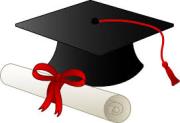
|
|
Graduation and Thesis Submission
Congratulations on your Achievement;
Catherine Vreugdenhil: Approval for admission to the Degree
Castillo Gonzalez: Approval for admission to the Degree
Louise Schoneveld: submitted for examination |
|

|
|
Rocktail - Party
Rocktail photo's show the party was enjoyed by all. |
|
|
Carer support for travelling staff members:

|
|
|
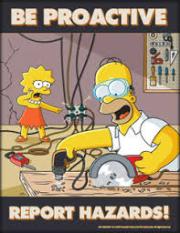
|
|
Using Figtree will help make our School as safe as possible
Take a look at the new Figtree Incident and Hazard reporting tool online: Figtree Incident & Hazard Reporting
Figtree can be used to report hazards as well as incidents. It documents and escalates both hazards and incidents until they are reviewed and completely resolved. |
|
|
Follow us on Twitter:

|
|
|
|
Joint Colleges of Science Equity and Diversity Seminar

|
|
|
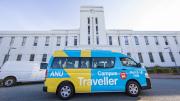
|
|
Free Hail & Ride Bus Service
The Campus Traveller is here to help ease parking congestion by linking car parking areas with a free and convenient all-day shuttle bus
Download the Campus Traveller route map here, visit the website, or check the FAQ's |
|
|
Grant and Funding Opportunities
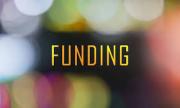
|
|
ANU Education Grants Scheme
Applications for Round 1 of the 2018 ANU Education Grants scheme are due 10am 17 October 2017
ANU Vice-Chancellor's Teaching Enhancement Grants (ANUTEG) support innovative and creative teaching initiatives and projects, and are linked to improving coursework student learning at undergraduate or postgraduate level.
ANU Linkage for Learning and Teaching Grants (ANULLTG) support strategic connections between ANU and organisations outside of the higher education sector to develop opportunities for ANU coursework students. Submit your applications to promotingexcellence@anu.edu.au by 10am Tuesday 17 October.
2017 Travel Grants for Women in STEM
Female employees and PHD students with a STEM related focus at Australian universities or research organisations - you are eligible to apply for the Campus Travel and Virgin Australia 2017 Travel Grant. Applications close Friday 20 October 2017
>>> Read More
The Earth-Life Science Institute, ELSI Origins Network (EON) at Tokyo Institute of Technology offers a range of opportunities and funding for international researchers and students. Check out the EON seed grants and visitor opportunities . EON also hosts workshops with a requirement for interdisciplinary, international speakers and early career researchers are encouraged to attend. Students should watch out for the Summer and Winter student workshops! |
|
|
|